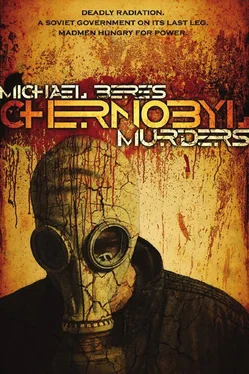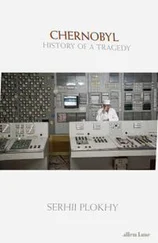Michael Beres - Chernobyl Murders
Здесь есть возможность читать онлайн «Michael Beres - Chernobyl Murders» весь текст электронной книги совершенно бесплатно (целиком полную версию без сокращений). В некоторых случаях можно слушать аудио, скачать через торрент в формате fb2 и присутствует краткое содержание. Жанр: Триллер, на английском языке. Описание произведения, (предисловие) а так же отзывы посетителей доступны на портале библиотеки ЛибКат.
- Название:Chernobyl Murders
- Автор:
- Жанр:
- Год:неизвестен
- ISBN:нет данных
- Рейтинг книги:4 / 5. Голосов: 1
-
Избранное:Добавить в избранное
- Отзывы:
-
Ваша оценка:
- 80
- 1
- 2
- 3
- 4
- 5
Chernobyl Murders: краткое содержание, описание и аннотация
Предлагаем к чтению аннотацию, описание, краткое содержание или предисловие (зависит от того, что написал сам автор книги «Chernobyl Murders»). Если вы не нашли необходимую информацию о книге — напишите в комментариях, мы постараемся отыскать её.
Chernobyl Murders — читать онлайн бесплатно полную книгу (весь текст) целиком
Ниже представлен текст книги, разбитый по страницам. Система сохранения места последней прочитанной страницы, позволяет с удобством читать онлайн бесплатно книгу «Chernobyl Murders», без необходимости каждый раз заново искать на чём Вы остановились. Поставьте закладку, и сможете в любой момент перейти на страницу, на которой закончили чтение.
Интервал:
Закладка:
“You have been with the militia for many years, Detective Horvath. Your service has been loyal, and you have proven your detection skills. Although it is not a promotion, the receipt of a new car is an honor.”
“I realize this,” said Lazlo. “And I appreciate it.”
“Many other detectives do not respond as consistently as you.
Perhaps because you do not have family matters to attend to. The woman murdered near the post office in Kalinin Square, for example. If you had not arrived at the scene before dawn to have the area cordoned off, street cleaners would have flushed the shell casings down the sewer. Timing. It’s all a matter of efficient response.”
“Thank you, sir.”
“And your translations of Hungarian material have also proved valuable,” said Chkalov. “When you joined the detectives, pessi-mists questioned whether an officer from the western frontier could be trusted. Despite your comrades still calling you by the pet name Gypsy, you have proven yourself worthy.”
“I appreciate your comments, sir.”
“By the way, Detective Horvath. Why do you think the name Gypsy has endured so many years?”
“It’s an affectionate name. I’ve not tried to discourage its use.”
“Well,” said Chkalov, his tone becoming heavier, “perhaps you should discourage it. Gypsy could imply you’d wander off. We wouldn’t want you making off with the militia’s shiny new Zhiguli.”
Chkalov had laughed then, his chair squeaking as his chest heaved. “I’m joking, Detective Horvath. I know a man of your stat-ure would not run away. There’s too much for you here in Kiev.
Your position, wine and women, and even Gypsy orchestras playing in the clubs. Not as many Gypsy orchestras as in Budapest, but enough. Of course, the Gypsy culture is nothing more than nostal-gia, even for you. And now Hungarian is a second language to you.
You are a true Soviet citizen, Detective Horvath.”
But Chkalov was unaware of many things. After the holiday at the farm last August, speaking Russian again had been difficult.
If it weren’t for his brother, Mihaly, and his family, Lazlo would like nothing better than to leave the Soviet Union. If only Chkalov knew how much all the detectives at the Kiev station hated to sit through his long-winded sessions ranging from syrupy praise to chest-pounding nationalism. Very few knew how Lazlo came by the name Gypsy, not even Chkalov.
The keys dangling from the ignition of the Zhiguli rang out as the wheels hit a series of holes hidden beneath the snow. Lazlo held the jittering steering wheel tightly and drove on. To the north, where Mihaly and Nina and the girls awaited him, the sky was dark.
When Lazlo neared Pripyat, he could see evidence of the Chernobyl Nuclear Facility to his right. A tall fence paralleling the road, warning signs threatening trespassers, high-tension towers leading away from the facility. It had stopped snowing, and where the road crested a hill, he saw the red-and-white-banded reactor stacks and the rectangular-shaped buildings in the river valley. The buildings resembled a string of coffins. The high-tension towers leading away from the buildings became a line of mourners waiting to pay their respects.
If something was wrong at Chernobyl, as Mihaly had implied last summer, perhaps the denials in letters and phone calls were because he feared the mail was being read and phone calls overheard.
Today they would finally be face to face.
The road came to a T. When Lazlo stopped, he could see the entry gate to the Chernobyl Facility to his right. A black Volga was parked outside the gate and a man in a dark hat and coat stood talking to a uniformed guard. It was the same Volga that had passed him earlier.
Lazlo turned left on the road to Pripyat and looked into the rearview mirror. The man from the Volga glanced his way. Although there was no way to be certain, Lazlo knew the man could be KGB. But even if it was KGB, the suspicious nature of their agents made them glance at any car driving past on a snowy Sunday. Driving the last few kilometers to Pripyat, he watched the mirror but did not see the Volga.
“If the KGB is watching you,” said Mihaly, “I can understand why.
It’s your letters. I kept telling you everything was fine. Why didn’t you believe me?”
Lazlo was alone with Mihaly, an after-dinner walk in the small park outside the apartment complex. They walked among abandoned playground equipment, looking down and listening as their boots creaked in the snow. They spoke in Hungarian.
“I carefully phrased the letters,” said Lazlo. “Anyone reading them would assume it was a personal matter. And I didn’t say the KGB was watching me. I simply told you about a car I saw on my way here. You’re the one who started it back in August, talking about Chernobyl.”
Mihaly nodded. “I suppose you needed reassurances after what I said.”
“You had me picturing Gorbachev trying to win propaganda points by blowing up a reactor, then showing how compassionate he is.”
“I’m sorry, Laz. Last summer it was the wine. My letters were the truth. Everything’s fine. Simply occasional problems to be solved and tests to be run. On holiday I made a mistake with my big mouth. You asked me about something else, and I used Chernobyl to cover it up.”
Mihaly turned to him. “I’m an ordinary man, Laz. I have ordinary faults and weaknesses and feelings. I’ve let my emotions get in the way of reason.”
“Is it about Nina?”
Mihaly looked away. “Nothing’s wrong with Nina. It’s me, Laz.
You’re the only one I can talk to. I should have told you last summer, but I was a coward. I’ve… been seeing another woman.”
They stopped at a series of interconnected wooden platforms designed for children to climb in better weather. Mihaly sat on a low platform even though it was covered with snow. Lazlo stood above Mihaly. He wanted to scream. He was aware of having left his Makarov and shoulder holster locked in the Zhiguli. He wanted to tell Mihaly he had experience killing another man. Blood spurt-ing from a boy’s face momentarily blurred his vision…
Mihaly looked up. “I’m still seeing her, Laz. I’m still seeing her, and I feel guilty as hell.”
“You should feel guilty!”
“She works at Chernobyl,” said Mihaly. “She’s from another division. I didn’t seek her out. We simply met on occasion.”
“An occasional fuck?”
“It’s not her fault or my fault. It simply happened.”
“I hear this all the time from criminals! Nothing simply happens!”
“I understand your anger, Laz. In a way I welcome it.”
“You welcome it? A boy being scolded? You’re a man with responsibilities to a family!”
“I don’t expect you to understand. But I want you to know I still love Nina and the girls.”
Lazlo felt dizzy and braced himself against a vertical section of the playground equipment.
Mihaly looked down. “Please believe me, Laz. Juli is also sensitive to my family. We’ve discussed ending our relationship. But we keep putting it off. I felt if I told you, I’d gather courage to end it.
I still love Nina. Nothing… no, I can’t say nothing has changed.”
Mihaly looked up. There were tears in his eyes. “Everything has changed, Laz. It’s tearing me apart. All I can think about is Nina finding out. Sometimes I think she’s already found out because of the way she acts. But it can’t be. She must be reacting to the way I act
…”
“Next time you’re with this lover of yours… what was her name?”
“Juli.”
“Next time you’re with this Juli, you think of me! Think of your old brother because he’s going to tell you something he never thought he’d tell anyone. It’s about Nina. It’s about my feelings. It’s about sibling jealousy and envy and unfulfilled desire. When you’re at the market with Nina, don’t you see other men and even women looking at her? What the hell do you think it means, Mihaly? She doesn’t have a deformity, does she? I guess not! Perhaps it’s beauty.
Читать дальшеИнтервал:
Закладка:
Похожие книги на «Chernobyl Murders»
Представляем Вашему вниманию похожие книги на «Chernobyl Murders» списком для выбора. Мы отобрали схожую по названию и смыслу литературу в надежде предоставить читателям больше вариантов отыскать новые, интересные, ещё непрочитанные произведения.
Обсуждение, отзывы о книге «Chernobyl Murders» и просто собственные мнения читателей. Оставьте ваши комментарии, напишите, что Вы думаете о произведении, его смысле или главных героях. Укажите что конкретно понравилось, а что нет, и почему Вы так считаете.












